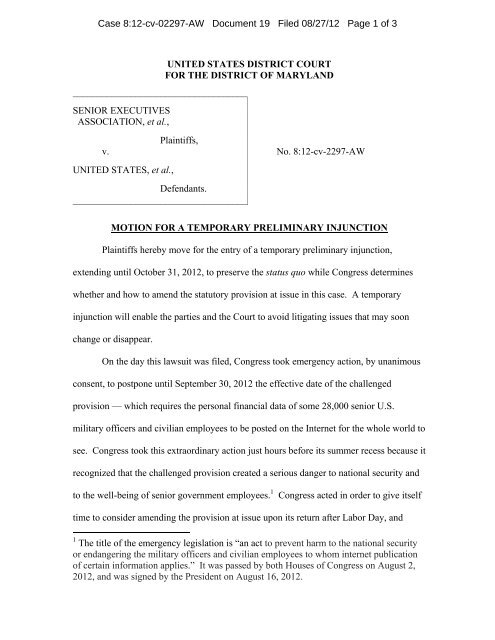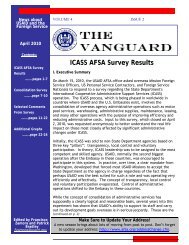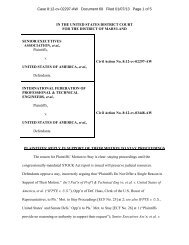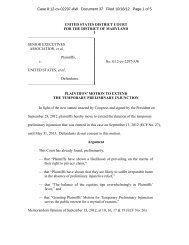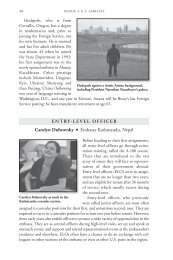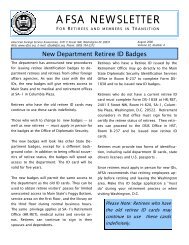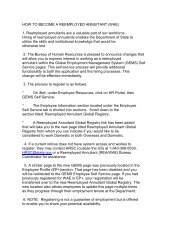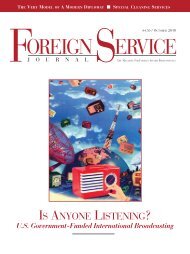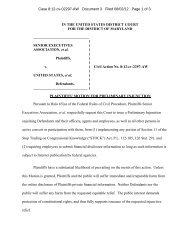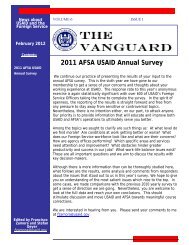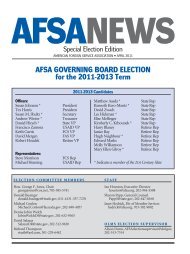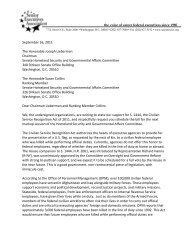Motion for Temporary Preliminary Injunction - Senior Executives ...
Motion for Temporary Preliminary Injunction - Senior Executives ...
Motion for Temporary Preliminary Injunction - Senior Executives ...
You also want an ePaper? Increase the reach of your titles
YUMPU automatically turns print PDFs into web optimized ePapers that Google loves.
Case 8:12-cv-02297-AW Document 19 Filed 08/27/12 Page 1 of 3____________________________________SENIOR EXECUTIVESASSOCIATION, et al.,UNITED STATES DISTRICT COURTFOR THE DISTRICT OF MARYLANDPlaintiffs,v. No. 8:12-cv-2297-AWUNITED STATES, et al.,Defendants.____________________________________MOTION FOR A TEMPORARY PRELIMINARY INJUNCTIONPlaintiffs hereby move <strong>for</strong> the entry of a temporary preliminary injunction,extending until October 31, 2012, to preserve the status quo while Congress determineswhether and how to amend the statutory provision at issue in this case. A temporaryinjunction will enable the parties and the Court to avoid litigating issues that may soonchange or disappear.On the day this lawsuit was filed, Congress took emergency action, by unanimousconsent, to postpone until September 30, 2012 the effective date of the challengedprovision — which requires the personal financial data of some 28,000 senior U.S.military officers and civilian employees to be posted on the Internet <strong>for</strong> the whole world tosee. Congress took this extraordinary action just hours be<strong>for</strong>e its summer recess because itrecognized that the challenged provision created a serious danger to national security andto the well-being of senior government employees. 1 Congress acted in order to give itselftime to consider amending the provision at issue upon its return after Labor Day, and1 The title of the emergency legislation is “an act to prevent harm to the national securityor endangering the military officers and civilian employees to whom internet publicationof certain in<strong>for</strong>mation applies.” It was passed by both Houses of Congress on August 2,2012, and was signed by the President on August 16, 2012.
Case 8:12-cv-02297-AW Document 19 Filed 08/27/12 Page 2 of 3government counsel has noted that it is likely that the provision will be amended be<strong>for</strong>ethe new September 30 deadline. It would there<strong>for</strong>e be a great waste of this Court’s timeand energy, not to mention the time and resources of counsel, to litigate over the statute inits current <strong>for</strong>m when that <strong>for</strong>m may change within a month.Because Defendants are unwilling to consent to even a brief postponement of theSeptember 30 deadline <strong>for</strong> Internet posting of Plaintiffs’ personal financial in<strong>for</strong>mation,and because Plaintiffs have made the necessary showings to support the entry of apreliminary injunction, the Court should issue a temporary preliminary injunction that willmaintain the status quo until October 31, 2012, to enable the parties to litigate this case inlight of whatever changes Congress makes to the challenged statute in September.The grounds <strong>for</strong> this motion are more fully set out in the accompanyingmemorandum. A proposed order is also filed herewith.Dated: August 27, 2012Respectfully submitted,/s/ Daron T. Carreiro____________________Jack McKay (D. Md. Bar No. 05628)Thomas G. AllenDaron T. Carreiro (D. Md. Bar No. 18075)Kristen E. BakerVernon C. Thompson, Jr.PILLSBURY WINTHROP SHAW PITTMAN LLP2300 N Street, N.W.Washington, DC 20037Office: (202) 663-8000Fax: (202) 663-8007Email: jack.mckay@pillsburylaw.comthomas.allen@pillsburylaw.comdaron.carreiro@pillsburylaw.comkristen.baker@pillsburylaw.comvernon.thompson@pillsburylaw.comand2
Case 8:12-cv-02297-AW Document 19 Filed 08/27/12 Page 3 of 3/s/ Arthur B. Spitzer____________________Arthur B. Spitzer (D. Md. Bar No. 08628)American Civil Liberties Unionof the Nation’s Capital4301 Connecticut Avenue, N.W., Suite 434Washington, DC 20008Office: (202) 457-0800Fax: (202) 457-0805Email: artspitzer@aclu-nca.orgCounsel <strong>for</strong> Plaintiffs3
Case 8:12-cv-02297-AW Document 19-1 Filed 08/27/12 Page 1 of 7____________________________________SENIOR EXECUTIVESASSOCIATION, et al.,UNITED STATES DISTRICT COURTFOR THE DISTRICT OF MARYLANDPlaintiffs,v. No. 8:12-cv-2297-AWUNITED STATES, et al.,Defendants.____________________________________MEMORANDUM IN SUPPORT OF PLAINTIFFS’ MOTIONFOR A TEMPORARY PRELIMINARY INJUNCTIONPlaintiffs’ motion <strong>for</strong> a temporary preliminary injunction should be granted <strong>for</strong> thefollowing reasons:1. Plaintiffs have shown a substantial likelihood of prevailingon the merits of their claims.In addition to the extensive showing made in Plaintiffs’ earlier motion <strong>for</strong> apreliminary injunction (ECF No. 3), which is hereby incorporated by reference, Congresshas now provided emphatic proof that Plaintiffs are likely to prevail on the merits.As explained in Plaintiffs’ earlier memorandum, the leading Fourth Circuit case onthe constitutional right to in<strong>for</strong>mational privacy is Walls v. City of Petersburg, 895 F.2d188 (4th Cir. 1990), which held that “[p]ersonal, private in<strong>for</strong>mation in which anindividual has a reasonable expectation of confidentiality is protected by one’sconstitutional right to privacy.” Id. at 192. That right specifically extends to a person’sprivate financial in<strong>for</strong>mation. Id. at 194. As Walls explained, however, that right toprivacy can be overcome by “a compelling governmental interest in disclosure [that]outweighs the individual’s privacy interest.” Id. at 192.
Case 8:12-cv-02297-AW Document 19-1 Filed 08/27/12 Page 2 of 7At the time Plaintiffs filed this lawsuit, the STOCK Act was in effect, requiringInternet publication of Plaintiffs’ private financial in<strong>for</strong>mation. The Defendants could atleast attempt to argue that Congress had identified an important governmental interest inInternet disclosure. Now, however, Congress itself has pulled the rug out from under thatargument, recognizing that the extension of Internet publication to thousands of senior U.S.military officers and career civilian employees — without hearings or debate — was amistake that needs to be corrected. Given Congress’ action (which is described more fullybelow), no serious argument can be made that there is a compelling governmental interestin the Internet publication of Plaintiffs’ private financial in<strong>for</strong>mation while Congress itselfconsiders how to deal with this issue. And without a compelling interest, Plaintiffs mustprevail under established Fourth Circuit law.2. Plaintiffs have shown that they and thousands of other seniorU.S. military officers and civilian employees will suffer irreparableharm in the absence of an injunction.In addition to the extensive demonstration of irreparable harm in Plaintiffs’ earlierpapers, Congress has also provided emphatic support <strong>for</strong> the proposition that Plaintiffswill suffer serious and irreparable harm because of the Internet publication requirement ofthe STOCK Act.Plaintiffs’ earlier memorandum and declarations (hereby incorporated byreference) laid out in detail the serious harms that likely would befall Plaintiffs andthousands of other senior U.S. military officers and civilian employees if their personalfinancial in<strong>for</strong>mation were posted on the Internet. The dangers of identity theft, financialfraud, harm to family relationships, blackmail, and even kidnapping of Americanstraveling abroad whose personal wealth would be known in detail by criminal elements2
Case 8:12-cv-02297-AW Document 19-1 Filed 08/27/12 Page 3 of 7are as obvious as they are serious. And these harms would be truly irreparable, becauseonce the in<strong>for</strong>mation is posted on the World Wide Web, it can never be made privateagain.On August 2, 2012, Congress passed, by unanimous consent in both chambers, S.3510, titled “an act to prevent harm to the national security or endangering the militaryofficers and civilian employees to whom internet publication of certain in<strong>for</strong>mationapplies.” The purpose of the bill was to extend the Internet publication deadline of theSTOCK Act from August 31, 2012, to September 30, 2012, so that Congress couldreconsider the requirement of Internet publication in light of the irreparable harm that itrecognized would flow from that publication. 1Senate Minority Leader Mitch McConnell explained why it was urgent andessential to pass the bill:Mr. MCCONNELL. Mr. President, S. 3510 addresses the concerns raisedby 14 of the most highly respected folks in the national security field, fromMichael Chertoff to Mike Mcconnell [sic] to Michael Mukasey, all ofwhom wrote with serious concerns about the application of one provisionof the STOCK Act requiring online posting of financial data which wouldpotentially impact the national security and the personal safety of nationalsecurity and law en<strong>for</strong>cement professionals and their families. These arevery serious concerns they have raised, and given that we are on the eve ofthe August district work period, we do not have time to adequately addressthose concerns. . . . It is <strong>for</strong> the safety and security of our brave men andwomen that we need to ensure they are protected which is exactly whatthis bill does.158 Cong. Rec. S5952 (daily ed. Aug. 2, 2012) (emphasis added). Thus, Congress hasnow confirmed Plaintiffs’ showing of irreparable injury when it cites the “very serious”concerns regarding “safety and security” of government personnel. It would be difficult to1 The full text of the bill was set out in Plaintiffs’ Notice of Congressional Action, filedAugust 6, 2012 (ECF No. 10). It was signed by the President on August 16, 2012. SeePlaintiffs’ Notice That S. 3510 Has Become Law, filed August 17, 2012 (ECF No. 14).3
Case 8:12-cv-02297-AW Document 19-1 Filed 08/27/12 Page 4 of 7imagine stronger proof of irreparable harm. 23. The harms to Plaintiffs from Internet publication of their privatefinancial in<strong>for</strong>mation far outweigh the harm to Defendantsfrom maintaining the status quo <strong>for</strong> one more month.The irreparable harm facing Plaintiffs is briefly described above, and detailed atgreater length in Plaintiffs’ earlier papers, which are hereby incorporated by reference.The harm to the government from delaying <strong>for</strong> one additional month the Internetpublication of the personal financial in<strong>for</strong>mation of senior U.S. military officers andcivilian employees is simply the abstract “harm” that may exist whenever a law isenjoined. There is no actual harm — if the Internet publication requirement is ultimatelyretained by Congress and upheld by the courts, the very same in<strong>for</strong>mation can then bepublished, <strong>for</strong> the world to see.4. The public interest favors maintaining the status quo at least untilafter Congress has had the opportunity to consider amending thechallenged provision and the parties have had the opportunity, ifnecessary, to litigate a motion <strong>for</strong> preliminary injunction based uponCongress’s action.“[U]pholding constitutional rights is in the public interest.” Legend Night Club v.Miller, 637 F.3d 291, 303 (4th Cir. 2011). The public interest here follows fromPlaintiffs’ demonstration that their constitutional rights will be irreparably abridged bycompelled Internet publication of their personal financial data by the government.Additionally, the public interest certainly favors protecting Plaintiffs and thousands of2 The letter referred to by Senator McConnell, which was sent to congressional leaders onJuly 19, 2012, by <strong>for</strong>mer Secretary of Homeland Security Michael Chertoff, <strong>for</strong>merAttorney General Michael Mukasey, <strong>for</strong>mer CIA Director Michael Hayden, <strong>for</strong>merDirector of National Intelligence Mike McConnell, and ten other very senior <strong>for</strong>merfederal officials in law en<strong>for</strong>cement, diplomatic, and national security positions, describedin stark terms the harms that were likely to result from the challenged provision of theSTOCK Act. The full text of that letter is attached hereto as Exhibit 1. Plaintiffsrespectfully commend it to the Court’s attention.4
Case 8:12-cv-02297-AW Document 19-1 Filed 08/27/12 Page 5 of 7other senior U.S. military officers and civilian employees while Congress considersamending the STOCK Act, and <strong>for</strong> a reasonable time thereafter, if necessary, to litigateany issues still presented by the statute as of the end of September.5. It would be a great waste of judicial resources, as well as the resourcesof government and private counsel, to litigate about the statute that thegovernment says will likely be amended.Finally, common sense and the principle of conservation of judicial resourcessupport issuing a temporary preliminary injunction under the current circumstances.Unless the requested injunction is issued, the parties will have to continue litigating overthe existing statute. The government will be required to file a major brief, the Plaintiffswill be required to file a reply, and the Court will be required to digest those briefs,research the issues, hold a hearing, and prepare a decision — all very likely <strong>for</strong> naught, asthe statute may be amended by late September to change or even eliminate the disputebetween the parties. All parties agree on this issue. See Reply in Support of Defendants’<strong>Motion</strong> <strong>for</strong> Extension of Time (ECF No. 17) at 3 (it is “unlikely” that Section 11 and itseffective date will remain unchanged).Without a temporary preliminary injunction, the litigation cannot go <strong>for</strong>ward in asensible way because Defendants’ brief will be due on September 21, which means it mustbe prepared be<strong>for</strong>e Congress recesses, and there<strong>for</strong>e very likely be<strong>for</strong>e Congress acts onthe STOCK Act. Plaintiffs then have only four days to file their reply, two of which areSaturday and Sunday. Thereafter the Court will have only two days to prepare <strong>for</strong> ahearing, and only one business day in which to issue a decision be<strong>for</strong>e the September 30deadline. And there will be no time <strong>for</strong> either party to seek emergency relief from the5
Case 8:12-cv-02297-AW Document 19-1 Filed 08/27/12 Page 6 of 7court of appeals. Only by issuing a temporary preliminary injunction can the Court avoidthis senseless waste of its own resources, and the parties’.CONCLUSIONThe traditional and essential purpose of a preliminary injunction is to preserve thestatus quo in the face of impending irreparable injury while a court sorts out the merits.That is precisely the situation presented here. Plaintiffs have shown that they are entitledto a preliminary injunction of the usual kind, good until a final decision on the merits.However, in light of the probability that Congress will amend the STOCK Act within thenext month, Plaintiffs at this time seek only a temporary preliminary injunction,preserving the status quo <strong>for</strong> an additional month so that the parties and the Court canaddress the statute that will exist at the end of September rather than the statute that existstoday. In addition to the standard four-factor test <strong>for</strong> preliminary relief, which Plaintiffshave satisfied, common sense and conservation of limited judicial resources stronglysupport issuance of a temporary preliminary injunction.6
Case 8:12-cv-02297-AW Document 19-1 Filed 08/27/12 Page 7 of 7For the reasons given above, as well as those in Plaintiffs’ earlier papers, themotion <strong>for</strong> a temporary preliminary injunction should be granted.Dated: August 27, 2012Respectfully submitted,/s/ Daron T. Carreiro____________________Jack McKay (D. Md. Bar No. 05628)Thomas G. AllenDaron T. Carreiro (D. Md. Bar No. 18075)Kristen E. BakerVernon C. Thompson, Jr.PILLSBURY WINTHROP SHAW PITTMAN LLP2300 N Street, N.W.Washington, DC 20037Office: (202) 663-8000Fax: (202) 663-8007Email: jack.mckay@pillsburylaw.comthomas.allen@pillsburylaw.comdaron.carreiro@pillsburylaw.comkristen.baker@pillsburylaw.comvernon.thompson@pillsburylaw.com/s/ Arthur B. Spitzer____________________Arthur B. Spitzer (D. Md. Bar No. 08628)American Civil Liberties Unionof the Nation’s Capital4301 Connecticut Avenue, N.W., Suite 434Washington, DC 20008Office: (202) 457-0800Fax: (202) 457-0805Email: artspitzer@aclu-nca.orgCounsel <strong>for</strong> Plaintiffs7
Case 8:12-cv-02297-AW Document 19-2 Filed 08/27/12 Page 1 of 5EXHIBIT 1(to Plaintiffs’ Memorandum in Support of <strong>Motion</strong><strong>for</strong> a <strong>Temporary</strong> <strong>Preliminary</strong> <strong>Injunction</strong>)
Case 8:12-cv-02297-AW Document 19-2 Filed 08/27/12 Page 2 of 5UPDATED VERSIONThe Honorable Harry ReidMajority LeaderUnited States SenateThe Honorable Mitch McConnellMinority LeaderUnited States SenateThe Honorable Carl LevinChairman of the Senate Committee on ArmedServicesUnited States SenateThe Honorable John McCainRanking Member of the Senate Committee on ArmedServicesUnited States SenateThe Honorable John KerryChairman of the Senate Committee on ForeignRelationsUnited States SenateThe Honorable Richard LugarRanking Member of the Senate Committee onForeign RelationsUnited States SenateThe Honorable Joe LiebermanChairman of the Senate Committee on HomelandSecurity and Governmental AffairsUnited States SenateThe Honorable Susan CollinsRanking Member of the Senate Committee onHomeland Security and Governmental AffairsUnited States SenateThe Honorable Dianne FeinsteinChairman of the Senate Select Committee onIntelligenceUnited States SenateThe Honorable Saxby ChamblissRanking Member of the Senate Select Committee onIntelligenceUnited States SenateThe Honorable Patrick LeahyChairman of the Senate Committee on the JudiciaryUnited States SenateThe Honorable Chuck GrassleyRanking Member of the Senate Committee on theJudiciaryUnited States SenateThe Honorable Eric CantorMajority LeaderHouse of RepresentativesThe Honorable Nancy PelosiMinority LeaderHouse of RepresentativesThe Honorable Buck McKeonChairman of the House Committee on ArmedServicesHouse of RepresentativesThe Honorable Adam SmithRanking Member of the House Committee on ArmedServicesHouse of RepresentativesThe Honorable Ileana Ros-LehtinenChairman of the House Committee on ForeignAffairsHouse of RepresentativesThe Honorable Howard BermanRanking Member of the House Committee onForeign AffairsHouse of RepresentativesThe Honorable Peter KingChairman of the House Committee on HomelandSecurityHouse of RepresentativesThe Honorable Bennie ThompsonRanking Member of the House Committee onHomeland SecurityHouse of RepresentativesThe Honorable Mike RogersChairman of the House Permanent Select Committeeon IntelligenceHouse of RepresentativesThe Honorable Dutch RuppersbergerRanking Member of the House Permanent SelectCommittee on IntelligenceHouse of RepresentativesThe Honorable Lamar SmithChairman of the House Committee on the JudiciaryHouse of RepresentativesThe Honorable John Conyers, Jr.Ranking Member of the House Committee on theJudiciaryHouse of Representatives
Case 8:12-cv-02297-AW Document 19-2 Filed 08/27/12 Page 3 of 5July 19, 2012 (Updated Version, 3:30 PM)RE: Application of Section 11 of the STOCK Act to National Security OfficialsDear Congressional Leaders:We are writing to express concern about section 11 of the Stop Trading in CongressionalKnowledge Act (the STOCK Act), which requires that the financial disclosure <strong>for</strong>ms of senior executivebranch officials be posted on the Internet by August 31. While we agree that the government should haveaccess to the financial in<strong>for</strong>mation of its senior officials to ensure the integrity of government decisionmaking, we strongly urge that Congress immediately pass legislation allowing an exception from theInternet posting requirement <strong>for</strong> certain executive branch officials, in order to protect the national securityand the personal safety of these officials and their families.The STOCK Act was intended to stop insider trading by Members of Congress. However,section 11 of the Act, which was added without any public hearings or consideration of national securityor personnel safety implications, requires that financial data of over 28,000 executive branch officialsthroughout the U.S. government, including members of the U.S. military and career diplomats, lawen<strong>for</strong>cement officials, and officials in sensitive national security jobs in the Defense Department, StateDepartment and other agencies, be posted on their agency websites.It is not clear what public purpose is served by inclusion of Section 11. We are not aware thatany transparency concerns have been raised about the adequacy of the existing review process <strong>for</strong>executive branch officials, most of whom have devoted their careers to public service. For severaldecades, executive branch officials have prepared and submitted SF-278 financial disclosure <strong>for</strong>ms totheir employing agencies. The completed <strong>for</strong>ms and the extensive financial data they contain arecarefully reviewed by agency ethics officers in light of the specific responsibilities of the officialssubmitting them in order to identify and eliminate potential conflicts of interest. Although the <strong>for</strong>ms maybe requested by members of the public, they are not published in hard-copy or on the Internet. Moreover,individuals requesting copies of the <strong>for</strong>ms must provide their names, occupation, and contact in<strong>for</strong>mation.Agencies generally notify the filing officials about who has requested their personal financial in<strong>for</strong>mation.In contrast, Section 11 of the STOCK Act would require that the financial disclosure <strong>for</strong>ms ofexecutive branch officials be posted on each agency’s website and that a government-wide database becreated containing the SF-278s that would be searchable and sortable without the use of a login or anyother screening process to control or monitor access to this personal in<strong>for</strong>mation.We believe that this new uncontrolled disclosure scheme <strong>for</strong> executive branch officials will createsignificant threats to the national security and to the personal safety and financial security of executivebranch officials and their families, especially career employees. Placing complete personal financialin<strong>for</strong>mation of all senior officials on the Internet would be a jackpot <strong>for</strong> enemies of the United Statesintent on finding security vulnerabilities they can exploit. SF-278 <strong>for</strong>ms include a treasure trove ofpersonal financial in<strong>for</strong>mation: the location and value of employees’ savings and checking accounts andcertificates of deposit; a full valuation and listing of their investment portfolio; a listing of real estateassets and their value; a listing of debts, debt amounts, and creditors; and the signatures of the filers. SF-278s include financial in<strong>for</strong>mation not only about the filing employee, but also about the employee’sspouse and dependent children.Posting this detailed financial in<strong>for</strong>mation on the Internet will jeopardize the safety of executivebranch officials — including military, diplomatic, law en<strong>for</strong>cement, and potentially intelligence officials— and their families who are posted or travel in dangerous areas, especially in certain countries in Asia,Africa, and Latin America. Embassy and military security officers already advise these officials to post
Case 8:12-cv-02297-AW Document 19-2 Filed 08/27/12 Page 4 of 5no personal identifying in<strong>for</strong>mation on the Internet. Publishing the financial assets of these officials willallow <strong>for</strong>eign governments, and terrorist or criminal groups to specifically target these officials or theirfamilies <strong>for</strong> kidnapping, harassment, manipulation of financial assets, and other abuse.Equally important, the detailed personal financial in<strong>for</strong>mation — particularly detailed in<strong>for</strong>mationabout debts and creditors — contained in the SF-278s of senior officials is precisely the in<strong>for</strong>mation that<strong>for</strong>eign intelligence services and other adversaries spend billions of dollars every year to uncover as theylook <strong>for</strong> in<strong>for</strong>mation that can be used to harass, intimidate and blackmail those in the government withaccess to classified in<strong>for</strong>mation. Yet under the STOCK Act, these SF-278s will be placed on the Internet<strong>for</strong> any <strong>for</strong>eign government or group to access without disclosing their identity or purpose and with nonotice to the employees or their agencies. We should not hand on a silver platter to <strong>for</strong>eign intelligenceservices in<strong>for</strong>mation that could be used to compromise or harass career public servants who have accessto the most sensitive in<strong>for</strong>mation held by the U.S. government.Section 11 could also jeopardize the safety and security of other executive branch officials, suchas federal prosecutors and others who are tracking down and bringing to justice domestic organized crimegangs and <strong>for</strong>eign terrorists. Crime gangs could easily target the families of prosecutors with substantialassets or debts <strong>for</strong> physical attacks or threats.Finally, publishing detailed banking and brokerage in<strong>for</strong>mation of executive branch officials,especially with their signatures, is likely to invite hacking, financial attacks, and identity theft of theseofficials and their families, particularly by groups or individuals who may be affected by theirgovernmental work.Given these inevitable adverse national security consequences, we urge you to amend the STOCKAct to protect U.S. national security interests and the safety of executive branch officials by creating anexception from the requirements of Section 11 <strong>for</strong> senior executive branch officials with securityclearances. The exception should also apply to other officials based on a determination by an agencyhead that an exception is necessary to protect the safety of the official or the official’s family. At the veryminimum, Congress should act to delay implementation of Section 11 until the national security andpersonal safety implications can be fully evaluated.If the financial disclosure <strong>for</strong>ms of senior executive officials are actually posted on the Internet inAugust, there will be irreparable damage to U.S. national security interests, and many senior executivesand their families may be placed in danger. This issue is too important to be trapped in partisan politics.We urge Congress to act swiftly, be<strong>for</strong>e the Congress goes on its summer recess on August 6.Sincerely,Richard ArmitageDeputy Secretary of State, 2001-2005John B. Bellinger IIIPartner, Arnold & Porter LLP; LegalAdviser, U.S. Department of State, 2005-2009; Legal Adviser, National SecurityCouncil, The White House, 2001-2005Joel BrennerNational Counterintelligence Executive,2006-2009; Inspector General, NationalSecurity Agency, 2002-2006Michael ChertoffSecretary of Homeland Security, 2005-2009Jamie GorelickDeputy Attorney General, 1994-1997;General Counsel, Department of Defense,1993-1994John HamreDeputy Secretary of Defense, 1997-2000
Case 8:12-cv-02297-AW Document 19-2 Filed 08/27/12 Page 5 of 5Michael HaydenGeneral USAF (RET); Director of theCentral Intelligence Agency 2006-2009;Director of the National Security Agency1999-2006Mike McConnellVice Admiral USN (RET); Director ofNational Intelligence, 2007-2009; Directorof the National Security Agency, 1992-1996Michael B. MukaseyPartner, Debevoise & Plimpton; AttorneyGeneral, 2007-2009; U.S. District Judge,Southern District of New York, 1988-2006John NegroponteDeputy Secretary of State, 2007-2009;Director of National Intelligence, 2005-2007Thomas PickeringUnder Secretary of State <strong>for</strong> PoliticalAffairs, 1997-2000; Former U.S.AmbassadorFrances TownsendAssistant to the President <strong>for</strong> HomelandSecurity and Counterterrorism, 2004-2008Kenneth L. WainsteinAssistant to the President <strong>for</strong> HomelandSecurity and Counterterrorism, 2008-2009; Assistant Attorney General <strong>for</strong>National Security, Department of Justice,2006-2008Juan ZarateDeputy National Security Advisor,Combating Terrorism, 2005-2009;Assistant Secretary of the Treasury,Terrorist Financing and Financial Crimes,2004-2005
Case 8:12-cv-02297-AW Document 19-3 Filed 08/27/12 Page 1 of 3____________________________________SENIOR EXECUTIVESASSOCIATION, et al.,UNITED STATES DISTRICT COURTFOR THE DISTRICT OF MARYLANDPlaintiffs,v. No. 8:12-cv-2297-AWUNITED STATES, et al.,Defendants.____________________________________[Proposed]TEMPORARY PRELIMINARY INJUNCTIONThe Court has be<strong>for</strong>e it Plaintiffs’ motion <strong>for</strong> a temporary preliminary injunction topreserve the status quo while Congress determines whether and how to amend thestatutory provision at issue in this case and thereby enable the parties and the Court toavoid litigating issues that may soon change or disappear.It appears to the Court that Congress has recognized, by passage of “an act toprevent harm to the national security or endangering the military officers and civilianemployees to whom internet publication of certain in<strong>for</strong>mation applies,” that thechallenged statutory provision endangers the national security and the safety of senior U.S.military officers and civilian employees, and that Congress is there<strong>for</strong>e likely to amendthat provision be<strong>for</strong>e the current September 30 deadline <strong>for</strong> Internet publication of thepersonal financial data of thousands of senior U.S. military officers and civilianemployees. Counsel <strong>for</strong> the United States agrees that amendment is likely.It further appears to the Court that it would be a waste of judicial resources, as wellas the resources of government and private counsel, to litigate over the statute in its
Case 8:12-cv-02297-AW Document 19-3 Filed 08/27/12 Page 2 of 3current <strong>for</strong>m when that <strong>for</strong>m may change within a month to obviate or at least reduce thevery harms that Plaintiffs seek to avoid by means of this lawsuit.Having carefully considered the papers filed by Plaintiffs and by Defendants, theCourt finds that Plaintiffs have demonstrated (i) a substantial likelihood of prevailing onthe merits of their claims, (ii) that they and thousands of other senior U.S. military officersand civilian employees will suffer irreparable harm in the absence of an injunction, (iii)that the harms to Plaintiffs from Internet publication of their private financial in<strong>for</strong>mationfar outweigh the harm to Defendants from maintaining the status quo <strong>for</strong> one more month,and (iv) that the public interest favors maintaining the status quo at least until afterCongress has had the opportunity to consider amending the challenged statutory provisionand the parties have had the opportunity, if necessary, to litigate a further motion <strong>for</strong>preliminary injunction based upon Congress’s action.Accordingly, it is herebyORDERED that Plaintiffs’ motion <strong>for</strong> a temporary preliminary injunction isGRANTED; and it isFURTHER ORDERED that Defendants, and their officers, agents and employees,as well as all other persons acting in active concert or participation with them, are herebyenjoined, until October 31, 2012, from implementing Section 11 of the STOCK Act tomake financial disclosure <strong>for</strong>ms of covered Executive Branch employees or thein<strong>for</strong>mation contained in them available on the websites of any agency of theUnited States or otherwise available on the Internet; and it isFURTHER ORDERED that Defendants, and their officers, agents and employees,as well as all other persons acting in active concert or participation with them, are hereby2
Case 8:12-cv-02297-AW Document 19-3 Filed 08/27/12 Page 3 of 3enjoined, until October 31, 2012, from requiring employees to submit financial disclosurein<strong>for</strong>mation so long as such in<strong>for</strong>mation is subject to Internet publication by federalagencies; and it isFURTHER ORDERED, that because Defendants will not suffer financial damageas a result of this injunction, Plaintiffs shall not be required to post a bond, and thisinjunction shall be effective immediately.Dated: September ____, 2012________________________________Alexander WilliamsUnited States District Judge3


